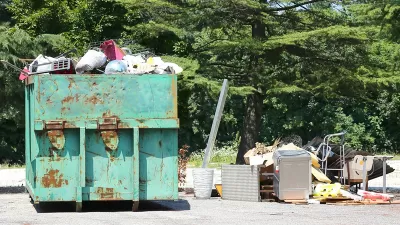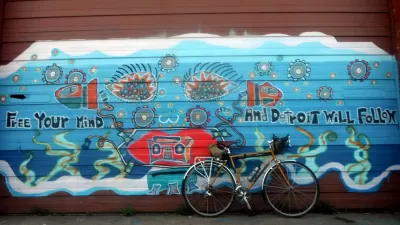Jason Hackworth argues that demolition has come to be seen as a good, in and of itself, in rust belt cities like Detroit; giving rise to policies that are wrong-headed and dangerous.

In recent years, the demolition of vacant homes and buildings has gone from being seen as a controversial act to being seen as inherently good. In a piece for American Politics and Policy Blog of the London School of Economics, Jason Hackworth argues that this is a dangerous assumption.
Hackworth opens his piece at a celebration of the demolishing of the 10,000th home in Detroit and uses this as a symbol of what he sees as exactly the wrong kind of thinking. Arguing that cities have become so enthusiastic about blight removal, that they've lost sight of the more important part of rebuilding cities and neighborhoods, the building itself.
"Detroit is not the only city to have embraced demolition-only urban policy. Cities across the region are using a variety of federal and state funds to demolish as much “blight” as they can," Hackworth claims. Through his research measuring the trajectory of neighborhoods with "extreme housing loss" Hackworth has found that, "The neighborhoods where demolitions have been most active are more economically and socially isolated than they were in 1970."
Hackworth condemns our celebration of demolition as "a collapse of policy imagination." Cautioning us against simplistic, quick fix thinking. Whether or not you find the research compelling, it's important to reexamine ideas billed as silver bullets for rebuilding communities and a reminder of the complexity inherent in rebuilding communities.
FULL STORY: Demolition-only urban policy leads to economic and social isolation.

Maui's Vacation Rental Debate Turns Ugly
Verbal attacks, misinformation campaigns and fistfights plague a high-stakes debate to convert thousands of vacation rentals into long-term housing.

Planetizen Federal Action Tracker
A weekly monitor of how Trump’s orders and actions are impacting planners and planning in America.

In Urban Planning, AI Prompting Could be the New Design Thinking
Creativity has long been key to great urban design. What if we see AI as our new creative partner?

King County Supportive Housing Program Offers Hope for Unhoused Residents
The county is taking a ‘Housing First’ approach that prioritizes getting people into housing, then offering wraparound supportive services.

Researchers Use AI to Get Clearer Picture of US Housing
Analysts are using artificial intelligence to supercharge their research by allowing them to comb through data faster. Though these AI tools can be error prone, they save time and housing researchers are optimistic about the future.

Making Shared Micromobility More Inclusive
Cities and shared mobility system operators can do more to include people with disabilities in planning and operations, per a new report.
Urban Design for Planners 1: Software Tools
This six-course series explores essential urban design concepts using open source software and equips planners with the tools they need to participate fully in the urban design process.
Planning for Universal Design
Learn the tools for implementing Universal Design in planning regulations.
Appalachian Highlands Housing Partners
Gallatin County Department of Planning & Community Development
Heyer Gruel & Associates PA
Mpact (founded as Rail~Volution)
City of Camden Redevelopment Agency
City of Astoria
City of Portland
City of Laramie





























